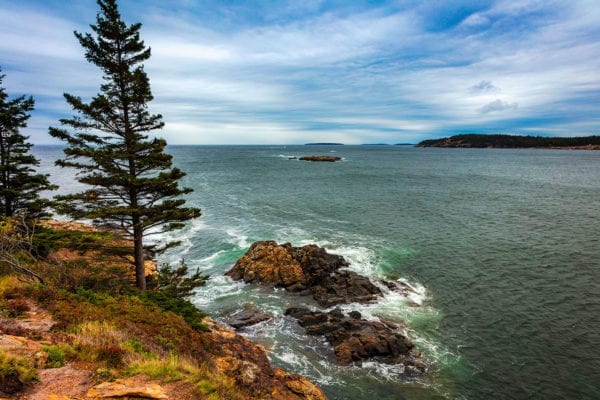On May 15, 2023, it was announced that the American Aquafarms processing facility in Gouldsboro would go up for auction as a foreclosure sale.
On April 20, 2022, the Maine Department of Marine Resources (DMR) announced that it was no longer processing American Aquafarms’ two lease applications for a massive industrial salmon farm in Frenchman Bay. Because the applications were terminated, the Norwegian-backed company will have to start over with its DMR permit application, setting the company back two to three years.
“The proposal to build one of the world’s largest industrial salmon farms in this beautiful bay next to Acadia National Park is a grave threat to area jobs, the environment, and the quality of life residents and visitors have enjoyed for generations.”
—Frenchman Bay United

Great Head Trail, Acadia NP and Frenchman Bay, photo by Michael Walsh
Frenchman Bay is a beautiful and spectacular natural resource, supporting a wide range of uses from commercial fishing to activities important for a vibrant tourism economy. The proposal by the Norwegian company American Aquafarms to build Maine’s largest ocean-based Atlantic salmon aquaculture project in Frenchman Bay raises serious environmental and economic concerns.
NRCM opposes the project for a number of reasons, including its proximity to Acadia National Park, threats it poses to the region’s clean air and water, and the negative impact it would have on local aquaculture farmers and fishing families.
Too Big, Too Risky, & The Wrong Place
- The American Aquafarms proposal is risky because of the unprecedented use of a new technology at an unprecedented scale—much larger than what could be permitted in Norway.1 The proposed project would include two sixty-acre semi-closed, floating net pen sites; a processing facility in Gouldsboro; and other facilities.2
- An industrial-scale fish farm threatens the viability of small-scale seafood producers, like lobstermen, fishermen, and kelp farmers who rely on a healthy coastal and marine environment for their living.
- The Bar Harbor Chamber of Commerce says the proposal would “detract from the scenic beauty of our area and imperil the existing tourism economy that provides jobs to more than 4,300 people and generates thousands of tax dollars for the state of Maine.”3
- The project would easily be seen from Acadia National Park, a national treasure with tourism that provides significant economic benefits to the region. It would also be visible from six islands protected by conservation easements,4 spoiling the viewshed of our iconic national park.
Industrial-scale Pollution Threats
- Ocean-based salmon farming creates massive amounts of pollution and spreads infection and disease.5,6
- At full capacity, American Aquafarms would produce 66 million pounds of salmon annually.7 Every day, 4.1billion gallons of untreated effluent would be discharged into Frenchman Bay, introducing excess nitrogen, phosphorous, and other chemicals to the water. This could harm native fish and lobsters and cause algae blooms.8
- Constant noise from the operation would likely cause harm to marine mammals including seals, porpoises, and whales.9
NRCM joined a chorus of organizations, businesses, and individuals opposed to the American Aquafarms proposal, including Frenchman Bay United, local fishermen, local towns, Maine-based environmental groups, and national conservation organizations. Maine has little to gain and a lot to lose from the proposed industrial-scale, ocean-based salmon farm.
Banner photo: View of Frenchman Bay from Cadillac Mountain at Acadia National Park, by B.Comeau/NRCM









